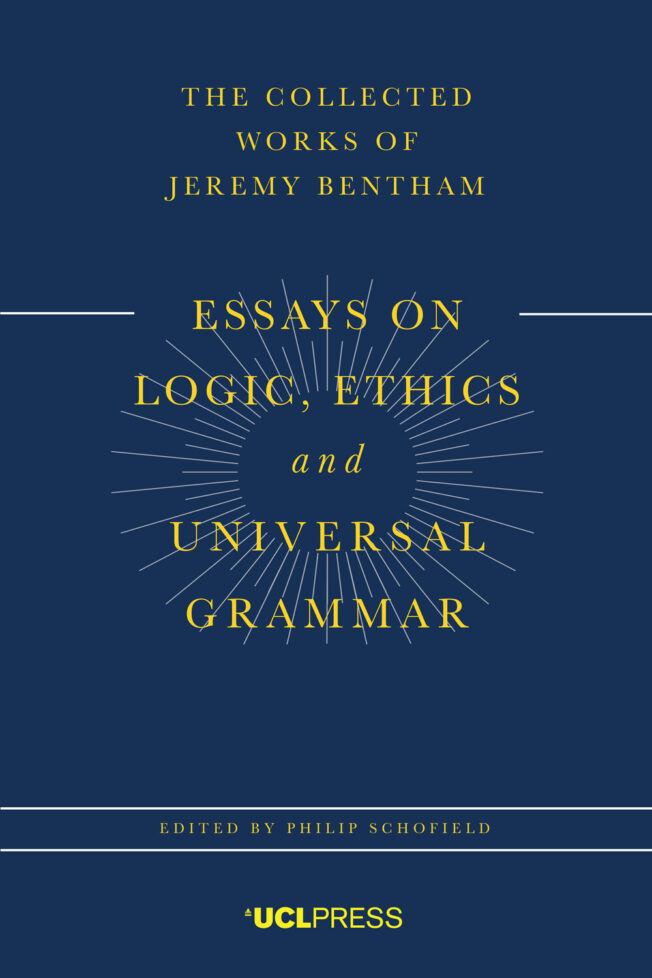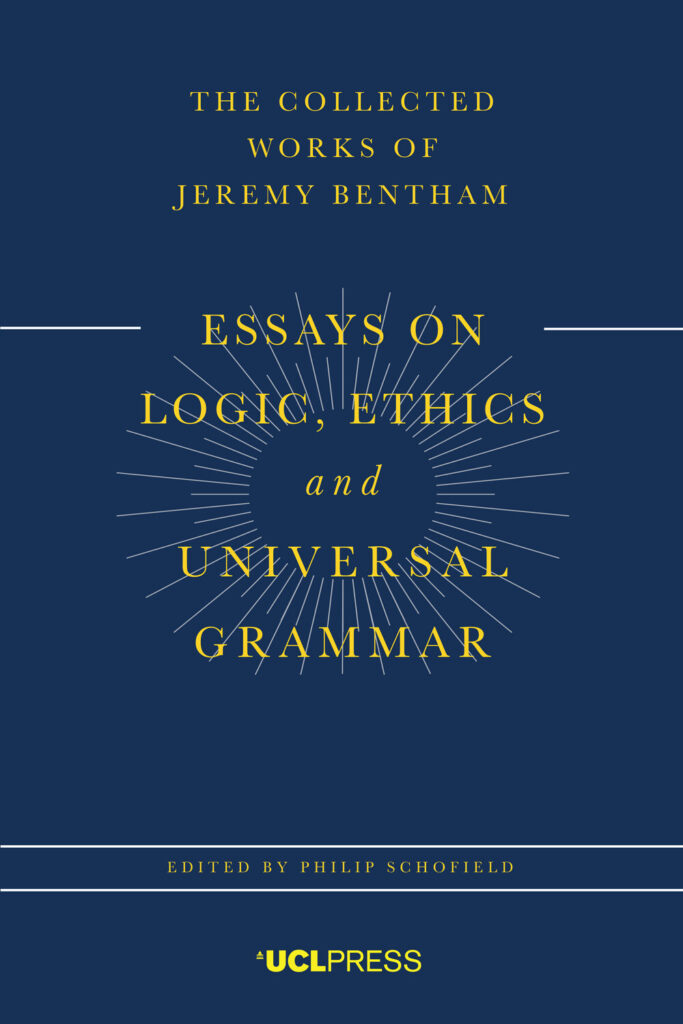
Essays on Logic, Ethics, and Universal Grammar
Philip Schofield (Editor)
This new volume of Bentham’s philosophical writings deals with his most fundamental ideas concerning logic, language, ethics, and grammar. It includes four major essays written between 1814 and 1816, namely ‘Essay on Logic’, ‘Essay on Ethics’, ‘Didacologia’, and ‘Universal Grammar’, all of them closely related to Chrestomathia, Bentham’s major work on education.
In ‘Essay on Logic’, Bentham contrasts the præcognita of Aristotle with his own ‘characteristics’ of logic and deals with methodization, ontology, and the relationship between logic and language. In ‘Essay on Ethics’, he offers a critique of the Aristotelian virtues and outlines his own division of ethics into prudence, probity, and benevolence. In ‘Didacologia’, he presents an outline of a comprehensive plan for the division of the arts and sciences based on the method of exhaustive bifurcation and a new nomenclature. In ‘Universal Grammar’, Bentham deals with language as the basis for thought and communication and investigates the nature of the different parts of speech. The volume is completed with an Appendix containing fragmentary material, written in August and September 1813, with a focus on language. All the texts are based on Bentham’s original manuscripts and have never before been published in authentic form.
Preface
Chapter 1. Logic, what
Chapter 2. Logic—its Characteristics—viz. 1. its End. 2. Field of Exercise. 3. Operations. 4. Faculties. 5. Instruments. 6. Functions. 7. Uses.
Chapter 3. III. Operations to the performance of which Logic is capable of affording direction and assistance
Chapter 4. IV. Faculties; V. Instrument; VI. Uses; VII. Functions
Chapter 5. Mental Operations and Faculties—Methodization—its Uses—Purposes and Subjects to which it is applicable. Advantageous effects producible by means of it
Chapter 6. Of Methodization, or arrangement
Chapter 7. Of Division
Chapter 8. Of Exposition by Paraphrasis with its subsidiary operations, viz. Phraseoplerosis and Archetypation
Chapter 9. Of Ontology: under which head are brought to view such objects as are designated by the most capacious and comprehensive appellations which the stock of Language affords
Chapter 10. Of Art in general—Operations performable in relation to it
Chapter 11. Of the art of Invention
Chapter 12. Of Discourse or Language in general—Operations which, in its character of an art, are performable in relation to it
Chapter 13. Of Improvement, considered as applicable to Language
Chapter 14. Of the Improvement of Language in respect of Copiousness
Chapter 15. Of Clearness in discourse—where the seat of the unclearness, actual or apprehended, is considered as being in the words taken singly:—and hence, of exposition
Chapter 16. Of the Qualities desirable in style: i.e. in language considered as employed by this or that individual
Chapter 17. Rules for the avoidance of the imperfections opposite to the qualities of Clearness (Non-Ambiguity and Non-Obscurity) and Impressiveness
Chapter 18. J.B.’s new ideas derived from Logic
APPENDIX
Chapter 1. Præcognita, or preliminary and general indications, concerning Logic, according to the Aristotelians
Chapter 2. Of Aristotle’s ten predicaments
Chapter 3. Of Aristotle’s Post-predicaments
Chapter 4. Modes of discussion—Aristotelian and Socratic
Chapter 5. Of discussion—disputation—argumentation—or debate: viz. of that branch of the Aristotelian logic which takes that operation for its subject
ESSAY ON ETHICS
Chapter 1. Of Well-being and Ill-being in general—Happiness and Unhappiness
Chapter 2. Sole and constant End of Action, or object of man’s pursuit, well-being
Chapter 3. Field of Ethics—its Divisions
Chapter 4. Virtue, what—Virtue self-regarding & extra-regarding—Prudence, its relation to self-regarding—Probity, Benevolence and Beneficence, their relation to Extra-regarding—Virtue and Vice unmeaning but for Pain & Pleasure
Chapter 5. Virtue—its modifications
Chapter 6. Of Beneficence and Benevolence
Chapter 7. Of Vanity and Pride
Chapter 8. Of Propriety, and its connection with Utility
Chapter 9. Of propriety, as between self-regarding or teleclectic Prudence on the one hand, and Probity and Beneficence taken together, on the other
Chapter 10. Aristotle’s Virtues—Virtues in general
Chapter 11. Fortitude
Chapter 12. Temperance
Chapter 13. Of Justice—its coincidence with probity
Chapter 14. Veracity—how reducible to prudence, probity and beneficence
Chapter 15. Of propriety, with reference to the pleasures and pains of amity
APPENDIX
Chapter 1. Modes of exercising the function of practical moralist
Chapter 2. Deontologist or Writing Moralist—proper and improper Modes of exercising this Function
Chapter 3. Of the causes of immorality
Chapter 4. Fictitious entities deriving their import from the pleasures and pains of the popular or moral sanction—their import—their pernicious influence
DIDACOLOGIA
Chapter 1. Art and Science Division
Chapter 2. Uses
APPENDIX
Generals or Particulars—Abstractions or Concretions which first
DOI: 10.14324/111.9781800089211
Publication date: 01 December 2025
PDF ISBN: 9781800089211
EPUB ISBN: 9781800089228
Hardback ISBN: 9781800089198
Paperback ISBN: 9781800089204
Philip Schofield (Editor) 
Philip Schofield is Director of the Bentham Project, Faculty of Laws, UCL, and General Editor of the new authoritative edition of The Collected Works of Jeremy Bentham.
The Correspondence of Jeremy Bentham, Volume 14
Philip Schofield, Tim Causer, Chris Riley,
07 May 2026
The Correspondence of Jeremy Bentham, Volume 13
Philip Schofield, Tim Causer, Chris Riley, Jeremy Bentham,
11 April 2024
New Directions in Private Law Theory
Fabiana Bettini, Martin Fischer, Charles Mitchell, Prince Saprai,
16 October 2023
Panopticon versus New South Wales and other writings on Australia
Tim Causer, Philip Schofield, Jeremy Bentham,
24 February 2022
Essays on Logic, Ethics, and Universal Grammar
This new volume of Bentham’s philosophical writings deals with his most fundamental ideas concerning logic, language, ethics, and grammar. It includes four major essays written between 1814 and 1816, namely ‘Essay on Logic’, ‘Essay on Ethics’, ‘Didacologia’, and ‘Universal Grammar’, all of them closely related to Chrestomathia, Bentham’s major work on education.
In ‘Essay on Logic’, Bentham contrasts the præcognita of Aristotle with his own ‘characteristics’ of logic and deals with methodization, ontology, and the relationship between logic and language. In ‘Essay on Ethics’, he offers a critique of the Aristotelian virtues and outlines his own division of ethics into prudence, probity, and benevolence. In ‘Didacologia’, he presents an outline of a comprehensive plan for the division of the arts and sciences based on the method of exhaustive bifurcation and a new nomenclature. In ‘Universal Grammar’, Bentham deals with language as the basis for thought and communication and investigates the nature of the different parts of speech. The volume is completed with an Appendix containing fragmentary material, written in August and September 1813, with a focus on language. All the texts are based on Bentham’s original manuscripts and have never before been published in authentic form.

